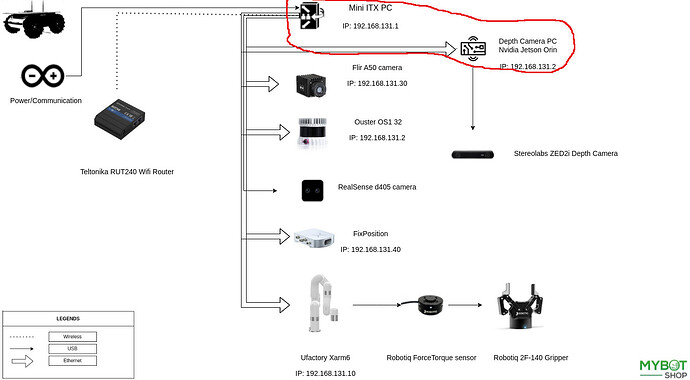Yes that is correct. To help you can use this as a template:
# Copyright 2024 Stereolabs
#
# Licensed under the Apache License, Version 2.0 (the 'License');
# you may not use this file except in compliance with the License.
# You may obtain a copy of the License at
#
# http://www.apache.org/licenses/LICENSE-2.0
#
# Unless required by applicable law or agreed to in writing, software
# distributed under the License is distributed on an 'AS IS' BASIS,
# WITHOUT WARRANTIES OR CONDITIONS OF ANY KIND, either express or implied.
# See the License for the specific language governing permissions and
# limitations under the License.
import os
import sys
from ament_index_python.packages import get_package_share_directory
from launch import LaunchDescription
from launch.actions import (
DeclareLaunchArgument,
OpaqueFunction,
SetEnvironmentVariable,
LogInfo
)
from launch.conditions import IfCondition
from launch.substitutions import (
LaunchConfiguration,
Command,
TextSubstitution
)
from launch_ros.actions import Node
# ZED Configurations to be loaded by ZED Node
default_config_common = os.path.join(
get_package_share_directory('nv_sensors'),
'config',
'zed2i_humble.yaml'
)
# URDF/xacro file to be loaded by the Robot State Publisher node
default_xacro_path = os.path.join(
get_package_share_directory('zed_wrapper'),
'urdf',
'zed_descr.urdf.xacro'
)
def parse_array_param(param):
str = param.replace('[', '')
str = str.replace(']', '')
arr = str.split(',')
return arr
def launch_setup(context, *args, **kwargs):
wrapper_dir = get_package_share_directory('zed_wrapper')
# Launch configuration variables
svo_path = LaunchConfiguration('svo_path')
use_sim_time = LaunchConfiguration('use_sim_time')
sim_mode = LaunchConfiguration('sim_mode')
sim_address = LaunchConfiguration('sim_address')
sim_port = LaunchConfiguration('sim_port')
stream_address = LaunchConfiguration('stream_address')
stream_port = LaunchConfiguration('stream_port')
camera_name = LaunchConfiguration('camera_name')
camera_model = LaunchConfiguration('camera_model')
node_name = LaunchConfiguration('node_name')
config_common_path = LaunchConfiguration('config_path')
serial_number = LaunchConfiguration('serial_number')
publish_urdf = LaunchConfiguration('publish_urdf')
publish_tf = LaunchConfiguration('publish_tf')
publish_map_tf = LaunchConfiguration('publish_map_tf')
publish_imu_tf = LaunchConfiguration('publish_imu_tf')
xacro_path = LaunchConfiguration('xacro_path')
custom_baseline = LaunchConfiguration('custom_baseline')
ros_params_override_path = LaunchConfiguration('ros_params_override_path')
enable_gnss = LaunchConfiguration('enable_gnss')
gnss_antenna_offset = LaunchConfiguration('gnss_antenna_offset')
camera_name_val = camera_name.perform(context)
camera_model_val = camera_model.perform(context)
enable_gnss_val = enable_gnss.perform(context)
gnss_coords = parse_array_param(gnss_antenna_offset.perform(context))
custom_baseline_val = custom_baseline.perform(context)
if (camera_name_val == ''):
camera_name_val = 'zed'
if (camera_model_val == 'virtual' and float(custom_baseline_val) <= 0):
return [
LogInfo(msg="Please set a positive value for the 'custom_baseline' argument when using a 'virtual' Stereo Camera with two ZED X One devices."),
]
config_camera_path = os.path.join(
get_package_share_directory('zed_wrapper'),
'config',
camera_model_val + '.yaml'
)
# Xacro command with options
xacro_command = []
xacro_command.append('xacro')
xacro_command.append(' ')
xacro_command.append(xacro_path.perform(context))
xacro_command.append(' ')
xacro_command.append('camera_name:=')
xacro_command.append(camera_name_val)
xacro_command.append(' ')
xacro_command.append('camera_model:=')
xacro_command.append(camera_model_val)
xacro_command.append(' ')
xacro_command.append('custom_baseline:=')
xacro_command.append(custom_baseline_val)
if(enable_gnss_val=='true'):
xacro_command.append(' ')
xacro_command.append('enable_gnss:=true')
xacro_command.append(' ')
if(len(gnss_coords)==3):
xacro_command.append('gnss_x:=')
xacro_command.append(gnss_coords[0])
xacro_command.append(' ')
xacro_command.append('gnss_y:=')
xacro_command.append(gnss_coords[1])
xacro_command.append(' ')
xacro_command.append('gnss_z:=')
xacro_command.append(gnss_coords[2])
xacro_command.append(' ')
# Robot State Publisher node
rsp_node = Node(
condition=IfCondition(publish_urdf),
package='robot_state_publisher',
namespace=camera_name_val,
executable='robot_state_publisher',
name='zed_state_publisher',
output='screen',
parameters=[{
'robot_description': Command(xacro_command)
}],
remappings=[
('~/robot_description', '/a200_1058/robot_description'),
('joint_states', '/a200_1058/platform/joint_states'),
('dynamic_joint_states', '/a200_1058/platform/dynamic_joint_states'),
('/diagnostics', '/a200_1058/diagnostics'),
('/tf', 'tf'),
('/tf_static', 'tf_static'),
],
)
node_parameters = [
# YAML files
config_common_path, # Common parameters
config_camera_path, # Camera related parameters
# Overriding
{
'use_sim_time': use_sim_time,
'simulation.sim_enabled': sim_mode,
'simulation.sim_address': sim_address,
'simulation.sim_port': sim_port,
'stream.stream_address': stream_address,
'stream.stream_port': stream_port,
'general.camera_name': camera_name_val,
'general.camera_model': camera_model_val,
'svo.svo_path': svo_path,
'general.serial_number': serial_number,
'pos_tracking.publish_tf': publish_tf,
'pos_tracking.publish_map_tf': publish_map_tf,
'sensors.publish_imu_tf': publish_imu_tf,
'gnss_fusion.gnss_fusion_enabled': enable_gnss
}
]
if( ros_params_override_path.perform(context) != ''):
node_parameters.append(ros_params_override_path)
# ZED Wrapper node
zed_wrapper_node = Node(
package='zed_wrapper',
namespace=camera_name_val,
executable='zed_wrapper',
name=node_name,
output='screen',
# prefix=['xterm -e valgrind --tools=callgrind'],
# prefix=['xterm -e gdb -ex run --args'],
#prefix=['gdbserver localhost:3000'],
parameters=node_parameters,
remappings=[
('~/robot_description', '/a200_1058/robot_description'),
('joint_states', '/a200_1058/platform/joint_states'),
('dynamic_joint_states', '/a200_1058/platform/dynamic_joint_states'),
('/diagnostics', '/a200_1058/diagnostics'),
('/tf', 'tf'),
('/tf_static', 'tf_static'),
],
)
return [
rsp_node,
zed_wrapper_node
]
def generate_launch_description():
return LaunchDescription(
[
SetEnvironmentVariable(name='RCUTILS_COLORIZED_OUTPUT', value='1'),
DeclareLaunchArgument(
'camera_name',
default_value=TextSubstitution(text='zed2i'),
description='The name of the camera. It can be different from the camera model and it will be used as node `namespace`.'),
DeclareLaunchArgument(
'camera_model',
default_value='zed2i',
description='[REQUIRED] The model of the camera. Using a wrong camera model can disable camera features.',
choices=['zed', 'zedm', 'zed2', 'zed2i', 'zedx', 'zedxm', 'virtual']),
DeclareLaunchArgument(
'node_name',
default_value='zed_node',
description='The name of the zed_wrapper node. All the topic will have the same prefix: `/<camera_name>/<node_name>/`'),
DeclareLaunchArgument(
'config_path',
default_value=TextSubstitution(text=default_config_common),
description='Path to the YAML configuration file for the camera.'),
DeclareLaunchArgument(
'serial_number',
default_value='0',
description='The serial number of the camera to be opened. It is mandatory to use this parameter in multi-camera rigs to distinguish between different cameras.'),
DeclareLaunchArgument(
'publish_urdf',
default_value='false',
description='Enable URDF processing and starts Robot State Published to propagate static TF.',
choices=['true', 'false']),
DeclareLaunchArgument(
'publish_tf',
default_value='false',
description='Enable publication of the `odom -> camera_link` TF.',
choices=['true', 'false']),
DeclareLaunchArgument(
'publish_map_tf',
default_value='false',
description='Enable publication of the `map -> odom` TF. Note: Ignored if `publish_tf` is False.',
choices=['true', 'false']),
DeclareLaunchArgument(
'publish_imu_tf',
default_value='false',
description='Enable publication of the IMU TF. Note: Ignored if `publish_tf` is False.',
choices=['true', 'false']),
DeclareLaunchArgument(
'xacro_path',
default_value=TextSubstitution(text=default_xacro_path),
description='Path to the camera URDF file as a xacro file.'),
DeclareLaunchArgument(
'ros_params_override_path',
default_value='',
description='The path to an additional parameters file to override the defaults'),
DeclareLaunchArgument(
'svo_path',
default_value=TextSubstitution(text='live'),
description='Path to an input SVO file.'),
DeclareLaunchArgument(
'enable_gnss',
default_value='false',
description='Enable GNSS fusion to fix positional tracking pose with GNSS data from messages of type `sensor_msgs::msg::NavSatFix`. The fix topic can be customized in `common.yaml`.',
choices=['true', 'false']),
DeclareLaunchArgument(
'gnss_antenna_offset',
default_value='[]',
description='Position of the GNSS antenna with respect to the mounting point of the ZED camera. Format: [x,y,z]'),
DeclareLaunchArgument(
'use_sim_time',
default_value='false',
description='If set to `true` the node will wait for messages on the `/clock` topic to start and will use this information as the timestamp reference',
choices=['true', 'false']),
DeclareLaunchArgument(
'sim_mode',
default_value='false',
description='Enable simulation mode. Set `sim_address` and `sim_port` to configure the simulator input.',
choices=['true', 'false']),
DeclareLaunchArgument(
'sim_address',
default_value='127.0.0.1',
description='The connection address of the simulation server. See the documentation of the supported simulation plugins for more information.'),
DeclareLaunchArgument(
'sim_port',
default_value='30000',
description='The connection port of the simulation server. See the documentation of the supported simulation plugins for more information.'),
DeclareLaunchArgument(
'stream_address',
default_value='',
description='The connection address of the input streaming server.'),
DeclareLaunchArgument(
'stream_port',
default_value='30000',
description='The connection port of the input streaming server.'),
DeclareLaunchArgument(
'custom_baseline',
default_value='0.0',
description='Distance between the center of ZED X One cameras in a custom stereo rig.'),
OpaqueFunction(function=launch_setup)
]
)

